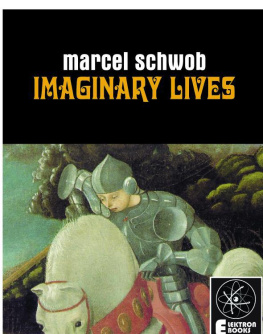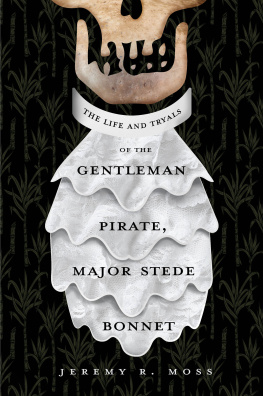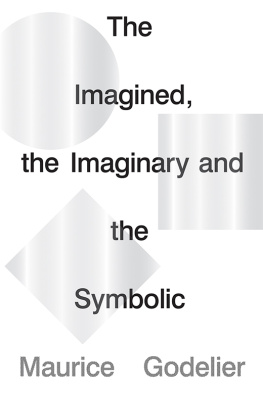
credits
IMAGINARY LIVES
BY MARCEL SCHWOB
AN EBOOK
ISBN 978-1-908694-36-2
PUBLISHED BY ELEKTRON EBOOKS
COPYRIGHT 2012 ELEKTRON EBOOKS
www.elektron-ebooks.com
No part of this publication may be reproduced, stored in a database or retrieval system, posted on any internet site, or transmitted, in any form, or by any means, electronic, mechanical, photocopying, recording or otherwise, without the prior permission of the copyright holders. Any such copyright infringement of this publication may result in civil prosecution
INTRODUCTION
Marcel Schwob (18671905) was one of the key symbolist writers, standing in French literature alongside such names as Stphane Mallarm, Octave Mirbeau, Andr Gide, Lon Bloy, Jules Renard, Rmy de Gourmont, and Alfred Jarry. His best-known works are Double Heart (1891), The King In The Gold Mask (1892), and the present volume, Imaginary Lives (1896). He was the first translator into French of Robert Louis Stevenson, and also helped Oscar Wilde with the writing in French of his controversial play Salome . Wilde dedicated his long poem The Sphinx to Schwob in 1894. Other writers to acknowledge Schwob included Paul Valry, with two dedications, and Alfred Jarry who dedicated his Ubu Roi to him.
Imaginary Lives contains twenty-two mythopoeic literary portraits of figures from ancient history, art history, and the history of crime and punishment. From demi-gods, sorcerers, incendiaries, wantons and philosophers of the ancient world, to the poet of hate Cecco Angiolieri and the painter Paolo Uccello, through to the pirates William Kidd and Major Stede-Bonnet, and finally Burke and Hare, the serial killers; Schwob presents a vivid array of characters who display all that is macabre, deviant and magnificently terrifying in human beings and in life.
In Imaginary Lives , Schwob has created a secret masterpiece that joins other biographical glossaries such as Jorge Luis Borges A Universal History Of Infamy and Alfonso Reyes Real And Imagined Portraits in the pantheon of classic speculative fiction, of which Schwobs book is the dark progenitor. Livid with decadent imagery, Imaginary Lives resonates loudly today with its themes of temporality, myth, violence and sexuality, and stands as a major work of the fin-de-sicle .
Sadly, it was to be Schwobs last significant work; his health had begun to deteriorate rapidly, and in 1901 he sailed to Samoa in search of a cure. Returning to Paris, he lived as a recluse until his death four years later. To compound the elements of classic decadence in his short life and career, it is said that he died from the effects of a syphilitic tumor in the rectum, resulting from sodomistic relations with a boy prostitute.
AUTHORS PREFACE
The science of history leaves us uncertain as to individuals, revealing only those points by which individuals have been attached to generalities.
History tells us that Napoleon was ill on the day of Waterloo; that we must attribute Newtons excessive intellectuality to the absolute consistency of his temperament; that Alexander was drunk when he killed Klitos; and that the fistula of Louis XIV was perhaps the cause of certain of his resolutions. Pascal speculates on the length of Cleopatras nose the possible consequences had it been a trifle shorter; and on the grain of sand in Cromwells urethra. All these facts are valued only when they modify events or alter a series of events.
They are causes, established or possible. We must leave them to savants.
Contrary to history, art describes individuals, desires only the unique. It does not classify, it unclassifies. No matter how much they may engage us, our generalizations may be likened to those pursued upon the planet Mars, and three lines drawn to intersect them might form a triangle on all the points of the universe. But consider a leaf with its intricate nerve system, its colour variegated by shade and sun; the imprint of a raindrop; the tiny mark left by an insect; the silver trace of a snail; or the first mortal touch of autumn gold. Search all the forests of the earth for another leaf exactly like it. I defy you to find one. There is no science for the teguments of a leaf, for the filaments of a cell structure, the winding of a vein, the passion of a habit, or for the twists and quirks of character.
That a mans nose is broken; one of his eyes higher than the other; an arm shrunken; that he habitually eats chicken at a certain hour or prefers Malvoise to Chateau-Margaux there is something unparalleled in the world. Thales might have exclaimed philosophically as well as Socrates, but he would never have scratched his leg in precisely the same manner before drinking the hemlock draught. Great minds and their ideas are humanitys common heritage. Actually, great men themselves possess only that which is bizarre about them. To describe a man in all his anomalies a book should be a work of art, like a Japanese print whereon the image of a tiny caterpillar, seen once at one particular hour of a day, is found eternally recorded.
On such individual facts history is silent. In the crude collection of material furnishing our testimony we find few singular or inimitable relics.
Misers all, valuing only politics or grammar, the ancient biographers have transmitted no more to us than the discourses of great men or the titles of their works. It was Aristophanes himself who gave us the joy of knowing that he was bald; and if the flat nose of Socrates had not served in literary comparisons, if his custom of walking barefoot had not been part of his system of philosophic scorn, we should have nothing left of him but moral dissertations. The gossip of Suetonius Tranquillus remains little more than spiteful polemic. Plutarchs genius made an artist of him at times, though while he realized the essence of his art, he was always imagining parallels, as if two men properly described in all their qualities can ever resemble each other. In our search we are driven to consider the Atheneum, Aulu-Gelle, the scholiasts and even Diogenes Lrce, who thought he had composed a sort of history of philosophy.
In modern times the study of the individual has developed advantageously. Boswells book would have been perfect had he not felt obliged to quote Johnsons correspondence together with digressions on Johnsons works. More satisfying on the whole are Aubreys Lives Of Eminent Men , Aubrey had the instinct of a true biographer, there can be no doubt about it. What a pity it is that this excellent antiquarians style could not rise to the level of his conceptions! His book might have been the eternal masterpiece of its species, for Aubrey never saw the necessity of establishing connections between individual facts and general actions.
Others, he knew, would some day mark the celebrity of those great men in whom he interested himself, and he was satisfied. Statesman, poet or clockmaker, each subject finds, under his pen, some unique trait distinguishing that man forever among all men. During his one hundred and ten years of life the painter Hokusai hoped to arrive at the ideal of his art. In that moment, he said, every point and every line traced by his pencil should be a living thing. By living he meant unique and individual.
Now lines and points are superlatively alike: geometry is founded on that postulate. Yet Hokusais perfection of art required a superlative difference between them. To that end ideal biography should seek infinite differentiation between two philosophies invented around the same metaphysic. That is why Aubrey, concerning himself uniquely with men, never attained perfection, for he never accomplished the miraculous transformation of resemblances and diversities hoped for by Hokusai. But neither did Aubrey attain the age of one hundred and ten. He is estimable, nevertheless, and he himself has summed up the limitations of his own book. I recall, he writes in his preface to Anthony Wood, General Lamberts words the best of men are but men at best and you will find numerous examples of such in this crude, precocious collection. Should these arcana be revealed today or thirty years hence? It might be better if author and subject (like medlars) first die and rot. Among Aubreys predecessors can be found some of the rudiments of his art. Diogenes Lrce tells us that Aristotle wore on his abdomen a leather bag filled with hot oil, and that a quantity of terra cotta vases were found in his house after his death.
Next page









